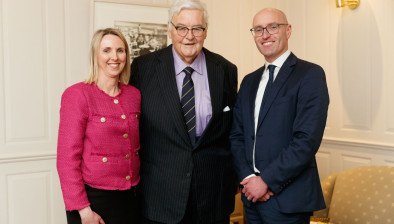Ronan Hynes: The law firm of the future?

Ronan Hynes
Ronan Hynes, partner at Sellors LLP, offers a sneak peek into the law firm of the future.
As we start to emerge from Covid-19 and take stock in a post-pandemic world, is there an opportunity to rethink the future law firm operating model? What does the future hold for law firms and the legal industry?
Is it a traditional partnership model with swollen pyramid, silos, billable hours, and lack of client-centricity? What did we learn from the pandemic? Will we retain some of the enforced benefits such as flexible and hybrid remote working, better work-life balance, shift to digital, omni channel client interactions, online courts, and more flexible court rules? Fast forward five years from now, what does the legal landscape look like?
With proposals for multi-disciplinary and collaborative partnerships on the horizon in Ireland, the future practice of law is both uncertain and exciting. Enter “NewLaw”.
NewLaw is the antithesis of big law or traditional law firms. NewLaw firms use disruptive technologies, more efficient use of human capital, value-based pricing, and different business models. With disruption already well under way, reverting to the pre-Covid-19 status quo is no longer viable.
Notably, the 2021 Smith & Williamson Annual Law Firm Survey hints that we are now entering a period of ‘new normal’ where the ability of firms to “learn, adapt and change” will be critical to future success. So what does the law firm of the future look like? Here’s a sneak preview.
Innovation, strategy and change competencies
History reminds us that firms who innovate during times of uncertainty or crisis reap the benefits long after. The late Steve Jobs of Apple viewed innovation as “the ability to see change as an opportunity, not as a threat”. Law firms of the future must develop innovation, strategy, and change competencies if they are to grasp the opportunities and sustain themselves over the medium to long term.
The pandemic has reinforced the importance of resilience, agility, and the critical role digital technologies play in client service. Firms that have these competencies will have an ability to carve out a path from the rest of legal field in the future.
Diverse professional workforce
Diversity and inclusion will take greater prominence for law firms in the future, as they realise the benefits of cognitive diversity. Law firms traditionally approached talent attraction, development and working practices, senior and leadership roles from a certain conservative, risk-averse viewpoint. Historically, perhaps there was also a lack of diversity of gender, age, disability, sexual orientation, but also cultural and class background.
This is improving but the challenge for law firms is to move beyond equality lip service to a workplace that is truly inclusive. A diverse professional workforce with more right-sided brain thinkers with the ability to be creative, innovative, to think holistically and be big picture orientated, will become increasingly important in the future. Non-legal professionals in areas such as legal project management, technology, digital marketing, and pricing will be critical to future law firm success.
Innovative pricing
Benjamin Franklin’s adage that ‘time is money’ symbolises the much beloved law firm billable hour. This model is increasingly accepted as dissatisfactory as it completely ignores client value and fosters a legal factory production line mentality, anathema to creativity and innovation.
Research from McKinsey found that Covid-19 has accelerated digitisation of customer interactions with firms by several years. The real competitive advantage for law firms therefore is not selling purely time but leveraging its intellectual capital, delivering effectiveness in client service, and capturing client lifetime value.
Innovative law firms understand that better innovative pricing options exist to maximise client value such as value-based and subscription-based pricing.
Digital law firm
Technology is now embedded into virtually every aspect of our personal and business lives. It is unequivocally a game-changer for the legal industry, acting both as a disrupter and enabler. Law firms that ignore digital transformation do so at their peril as it is no longer a nice-to-have luxury but an urgent necessity.
Technology means that we can now serve our clients better, faster, cheaper, and perhaps with a higher degree of quality than ever before. Law firms of the future should have digitisation high up on their legal agenda with the shift to digital likely to create new lines of business for both lawyers and law firms.
Different business models and pay structures
NewLaw is best described as a law firm on a diet and sheds some of the elements that are under pressure under the traditional partnership-based law firm: the swollen traditional pyramid, long hours, high capital costs, and inflexibility. NewLaw firms can provide a better work life balance without the need for rainmaking and billable hours.
We must acknowledge that the legal industry is shifting, and the question must be asked do we need to break free from the traditional law firm model? Research reveals that that consultancy, freelancing and virtual law firm models with a light variable cost base are now flourishing in the UK and beyond with different remuneration models to suit individual lawyer needs.
Value creation and delivery ideology
Warren Buffet famously commented that “price is what you pay, value is what you get”. Law firms of the future must concentrate on client value creation and delivery. How do law firms demonstrate true value to businesses and move beyond a perception of cost centre mentality in the eyes of clients? Listening more to clients’ wants and needs can help.
For example, corporate clients are looking for law firms to add value to projects rather than simply getting the work done at a competitive price. Research indicates that law firms traditionally believe that price is the top criteria on which they are evaluated by prospective commercial clients. In contrast, clients placed more emphasis on specialisation and leveraging technology to improve collaboration, productivity, efficiency, and work processes.
ESG responsible
Investors and businesses are growing increasingly concerned about sustainability and doing business responsibly. The triple bottom line is not just the preserve for magic circle law firms or a set of ubiquitous corporate buzzwords. ESG factors assess the impact of an organisation on the environment and society. The author predicts that ESG will become a corporate responsibility that potential customers and clients in law firms expect on a routine basis in the future.
What does this mean for law firms? Now is the time for firms to start thinking about ESG factors and formalising their own ESG strategies, including assessing their carbon footprint. Firms should also assess whether they have the necessary in-house expertise to properly advise clients in this future growth area.
Client-centred
The future of law is client-centred because the purpose of law firms must be serving their clients. However, up to now, law firms have surprisingly not positioned clients at the epicentre of the service offering. The perception of some buyers of legal services is that engaging a lawyer is too much trouble, too expensive and overwhelming. We need to change that perception.
Client-centred law firms will succeed here in the future because they focus on experience in a world where experience is key, and can provide a frictionless, barrier free service offering that is inextricably linked to client value.
Client experience
Today we live in the age of the consumer. For today’s legal clients, experience, and ease of going business are paramount. If other sectors can deliver fantastic client experience, great service, and satisfaction in consumer interactions, why not the legal sector? Modern clients expect more than a professional service, they expect an end-to-end customer experience that makes sense.
If a law firm is difficult to do business with, or lawyers are just simply rude or do not return client phone calls, sooner or later the client relationship will suffer and evaporate. In essence, the law firm of the future must not only provide a legal deliverable or outcome, but also in tandem a fantastic legal experience.
Agile, multidisciplinary and collaborative approach
Covid-19 brutally demonstrated to law firms the benefits of agility and structural ambidexterity. Law firms were required to become ‘mobile’ overnight and lawyers had to adapt to new ways of doing things. More winds of change are also on the horizon with the Legal Services Act 2015 proposing the introduction of multi-disciplinary partnerships (MDPs) for the first time ever in the Irish legal sector.
Such structures have been available in the UK since 2012 and their introduction has had a direct and positive impact on promoting the interests of consumers, competition and encouraging a strong, diverse, and effective legal profession.
Greater collaboration is also on the cards with the proposed new Courts and Civil Law (Miscellaneous Provisions) Bill 2021. If passed, the bill will enable lawyers and barristers to jointly provide legal services and facilitate a greater range of services and legal expertise for clients.
Conclusion
The successful law firm of the future will have at its core innovation, strategy, and change competencies. They will also have full digital capabilities both in-house and client facing. These elements will have knock on implications for the make-up of future law firms and we will see a greater emphasis on the recruitment of diverse, non-legal professionals equipped with the emerging skillsets of the digital 21st century.
The best law firms will be client-centred, have an obsession will value creation and delivery. Above all, they will provide a brilliant client experience. They will have an ability to price innovatively and not be slaved to the billable hour, time recording, utilisation, and realization rates. These legal service providers will understand client lifetime value, be agile, and utilize different business models with different pay structures. They will adopt a multi-disciplinary and collaborative approach, instead of pyramids, walls, and silos. Above all, the firm of the future will be sustainable and will have a keen eye on its ESG corporate responsibilities to support the agenda of its clients and wider society.
- Ronan Hynes is a partner at Sellors LLP.









